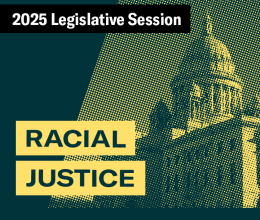In a 30-page report released today, the ACLU of Rhode Island said that a review of the latest statistics on police department traffic stop searches shows continued evidence of racial profiling in the state. The statistics further demonstrate, said the ACLU, that the search practices are not only unfair and discriminatory, they represent poor police work.
On the former point, the report shows that nine months of data collection mirror the results of a 2001-2002 study: racial minorities remain more than twice as likely as white drivers to be searched even though they are less likely to be found with contraband. The ACLU study found no general trend of improvement over the course of the nine months.
On the latter point, the ACLU report notes that discretionary searches by police actually turn up contraband less than one-fourth of the time, even though the searches are purportedly based on an officer’s “reasonable suspicion” or “probable cause” to believe that contraband will be found. In other words, an officers’ “reasonable suspicion” is wrong more than three out of four times.
Combined with the high racial disparities in searches, the report states that: “Stereotyping black and Hispanic drivers as being more likely to have contraband leads police officers to spend limited resources and time on unproductive fishing expeditions. Reducing these disparities is not just a matter of basic fairness, it is a matter of good policing.” In fact, the report notes, police departments that search fewer vehicles are generally likely to have a higher “hit” rate for contraband. Likewise, lower racial disparities generally correlate with higher “hit” rates.
The report called for various reforms, such as requiring every police department to submit a report confirming that traffic stop cards have been reviewed for disparities, and indicating what actions have been taken in response to any patterns relating to officers, locations or practices that are responsible for the disparity; requiring police to document their “probable cause” or “reasonable suspicion” grounds for conducting a search; and banning so-called “pretext stops” of drivers.
RI ACLU executive director Steven Brown said today: “Rhode Island now has close to three years of irrefutable statistics documenting significant racial disparities in police searches that cannot be explained by any factor other than race. Yet it appears that most departments are not taking even minimal steps to find out who or what is responsible for this problem. This is no longer just a problem of bad police-community relations. Police departments should also be concerned about the considerable time and resources being spent by officers to engage in unproductive searches. We look forward to working with the General Assembly in January to address this serious issue.”




